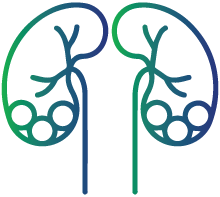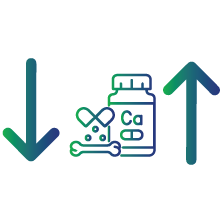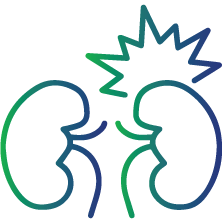
Parathyroid Hormone PTH (Intact)
What is Parathyroid Hormone (PTH) Test
The level of parathyroid hormone (PTH) in your blood is determined by a PTH (intact)-parathyroid hormone test. The parathyroid glands are four pea-sized glands present in the neck that produce PTH. Higher or lower than normal PTH levels can have a negative impact on the blood calcium levels and lead to serious medical conditions.
In some patients with kidney disease or hyperparathyroidism, which is characterized by an excess of PTH in the blood, healthcare providers use PTH (intact)-parathyroid hormone test to monitor the condition and see if the condition is improving, stable, or deteriorating.
If your parathyroid glands are overactive, PTH levels might be checked during parathyroid glands surgery. The PTH (intact)-parathyroid hormone test results will help the healthcare provider to verify that the overactive tissues have been successfully removed.
The parathyroid hormone stimulates calcium to be released from the bones. Since vitamin D aids in the absorption of calcium from food, it signals vitamin D conversion from its inactive to its active form in the kidneys. The hormone also signals the kidneys to decrease the excretion of calcium through urine. It is a component of a feedback mechanism involving calcium, vitamin D, phosphate, and magnesium to maintain normal levels of calcium in the blood.
Thus, getting your PTH (intact)-parathyroid hormone test done is recommended to diagnose parathyroid gland problems or to identify the cause of abnormal calcium levels.
Symptoms of too much calcium:

Weak bones

Frequent urination

Increased thirst

Nausea and vomiting

Fatigue

Kidney stones
Symptoms of too little calcium

A tingling sensation in your fingers or toes

Muscle cramps

Irregular heartbeat
What is a PTH test used for?
The intact parathyroid hormone test is done

To identify the cause for abnormally high or low calcium levels

To aid in the diagnosis of hyperparathyroidism (excessive parathyroid hormone secretion) and hypoparathyroidism (low parathyroid hormone secretion)

To monitor kidney disease
Preparation for test
No special preparation is required for PTH (intact)-parathyroid hormone test.
Interpretation of results
The units of measurement for the results are Picograms Per Milliliter (pg/mL)
|
Parameters |
Normal range (pg/mL) |
|
PTH (PARATHYROID HORMONE) Intact, serum |
14.00 - 72.00 |
Deviation from normal levels indicates the following:
- A higher than normal PTH hormone levels may be due to conditions such as primary hyperparathyroidism, secondary hyperparathyroidism, renal failure, and pseudohypoparathyroidism, etc.
- A lower than normal PTH hormone levels may be due to conditions such as hypoparathyroidism and hypercalcemia of malignancy, etc.
FAQs
How is the sample collected for a PTH (intact)-parathyroid hormone test?
A blood sample is collected from a vein in your arm using a small needle. Usually, this process does not take more than 5 minutes.
What are the risks involved in a PTH (intact)-parathyroid hormone test?
This test involves negligible risk. There might be slight pain or tenderness around the site where the needle went in. Rarely, the site can become infected.
What is the turnaround time (TAT) for the results of a PTH (intact)-parathyroid hormone test?
Results of a PTH (intact)-parathyroid hormone test are usually available within 48 hours after sample collection, although it could take longer at times.
When do I need a PTH (intact)-parathyroid hormone test?
It is recommended to take a PTH (intact)-parathyroid hormone test if you are experiencing symptoms of hypercalcemia (too much calcium) or hypocalcemia (too little calcium).
What factors can affect the results of a PTH (intact)-parathyroid hormone test?
The PTH (intact)-parathyroid hormone test may be impacted by factors such as high body fat percentage, vitamin D deficiency, Burnett's syndrome and vitamin supplements containing vitamins A and D, phosphates, steroids, certain medications, etc.

